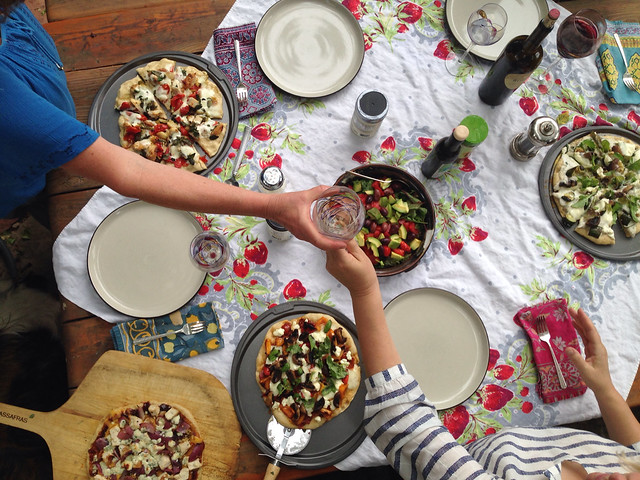[The Midweek Encounter is a ministry of Encounter Church in Kentwood, MI. These posts are reflections on Sunday's message, which can be heard here each week: http://myencounterchurch.org/#/messages-media]
A short time after Caleb and I began dating, he heard some “excellent”
relationship advice that he just had to share with me: “Run hard and fast
toward Jesus; if out of the corner of your eye, you see someone else running
the same way, that’s someone to consider.” And I thought to myself, “am I about
to be dumped for not reading my Bible enough?!”
I’m pretty sure I said something
like, “That’s exactly how we found each other!” and then immediately
redirecting the conversation. Perhaps you’ve been in a similar situation where
your mouth says you love God first and most, but your actions show that your
heart is otherwise ordered.
I was running toward Caleb. I definitely
loved Jesus, but finding a boyfriend/husband seemed to be a much more tangible
goal than growing a relationship with God. There really was a part of me that wanted
God to be first in my life, the part that admired missionaries in foreign
countries, people who were planning to go to seminary, and girls who woke up
early for quiet time instead of mirror time; that part of me knew this was
excellent advice. And there was another part of me, the part that likes
romantic comedies, flowers and chocolate, and Caleb; that part of me was winning.
Similar advice is distilled by the
writer of Proverbs in a few verses found at the very end of chapter 31.
Charm is deceptive and beauty is fleeting, but a woman who fears the LORD is to be praised. Proverbs 31:30
Charm is a cover up. If you’re covering up what’s underneath, you’re
probably not hiding a kind heart and God-loving spirit. Beauty is attractive, but
gravity and biology will eventually win: things stretch and sag (that tattoo
won’t be in the same place when you’re 70…), hair turns gray, and wrinkles
replace tan lines. Relationships built on temporal, worldly things will quickly
fail to satisfy.
 |
| Photo Credit: Flickr user Jelle Drok |
We can hear all of that, though,
and still miss the point: the writer isn’t directing us to a better form of
love, rather to a different object of our love. He confronts our cultural norms;
movies, sitcoms, dramas and lifestyle magazines promote the idea that romantic
love is the ultimate human endeavor. The false promise is that the right person
will fill all our empty places, repair all of our pot holes – someone who makes
us feel happily ever after. No human can live up to that standard.
If the focus of
your life is finding ultimate satisfaction in a mate, it will be a bumpy and
unsatisfying ride. Earlier in Proverbs 31 the writer describes an ideal spouse;
if you read those verses, you will discover that being the perfect spouse is an
impossible standard! Instead of attempting perfection and failing, we are invited
to acknowledge that we don’t come close to measuring up, but that Jesus measures
up perfectly. The holes and missteps and places we lack in marriage – or in
anything – should drive us to Him.
Some years of marriage (not even a
ton! Just some!) have revealed the not-so-secret secret that Caleb cannot be
everything to me. He is wonderful, self-sacrificing, deeply loving and caring;
but he is also flawed, finite, and limited in time and power. God, however, is infinite;
He is able to meet all of my needs. He is perfect! God is the creator of needs,
and the fulfiller. He is the only one who can repair our pot holes and fill our
empty places. Marriage is His design, and it is undoubtedly a blessing to be
enjoyed; but it is not the ultimate thing. He is. He was. He always will be.
Whenever we put
something in God’s place, the idol we create will disappoint us. Normally we
think of idols as really bad things like hoarding wealth, power, or pleasure. Marriage
is a sneaky idol, because desiring a good marriage is not a bad! But John
Calvin would tell us, “The evil in our desire typically does not lie in what we
want, but that we want it too much.” Even the best marriage will never fulfill
us in the way that God can.
Pastor Dirk boiled
the author’s advice down to a few questions: what is your perspective? Do you fear God and
have your eyes on Him? Is your happily ever after in His kingdom that is
coming? Are you being transformed by the Spirit to be more like Christ? If so,
marriages (and the process of finding someone to marry!) will be positively
affected by the new creation you are becoming.
So how do you
get to 40 years of bliss? Not by finding the perfect mate, becoming the perfect
mate, or by trying to perfect the one you have. Rather, by encouraging one
another as you run the good race, pressing on toward the prize. (1 Corinthians
9:24, Philippians 3:14) Encourage each other not to be better spouses, but more
faithful servants of the Most High God.
[Robin Bupp is married to Caleb, and they are from many places east of the Mississippi (but are calling Michigan home for the foreseeable future). A former high school science teacher, Robin is slowly turning the two Bupp kiddos into tiny nerds while they teach her lots of things, including humility and patience.]


